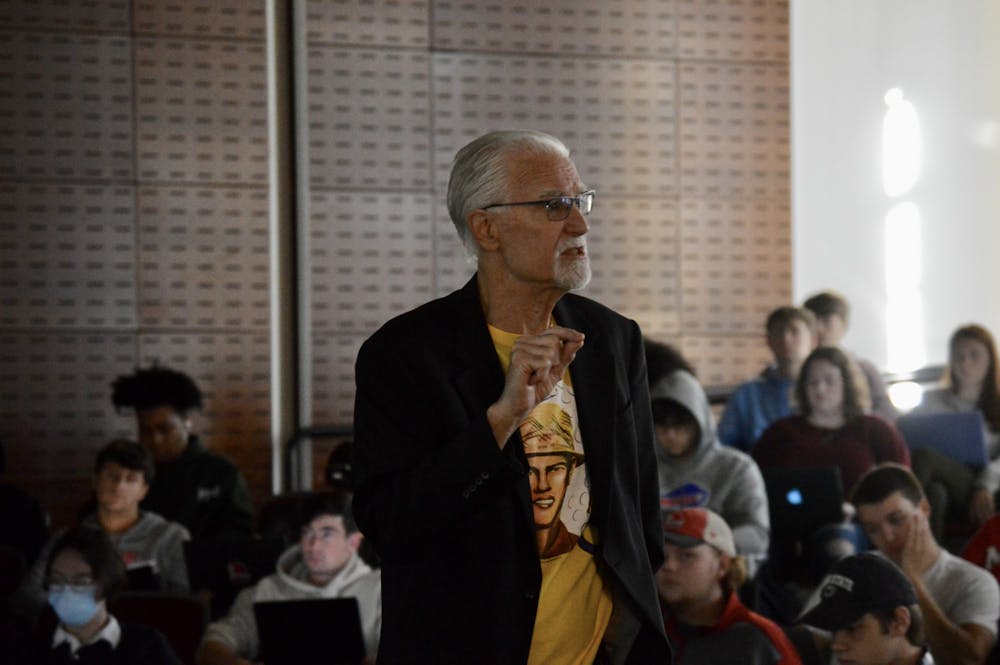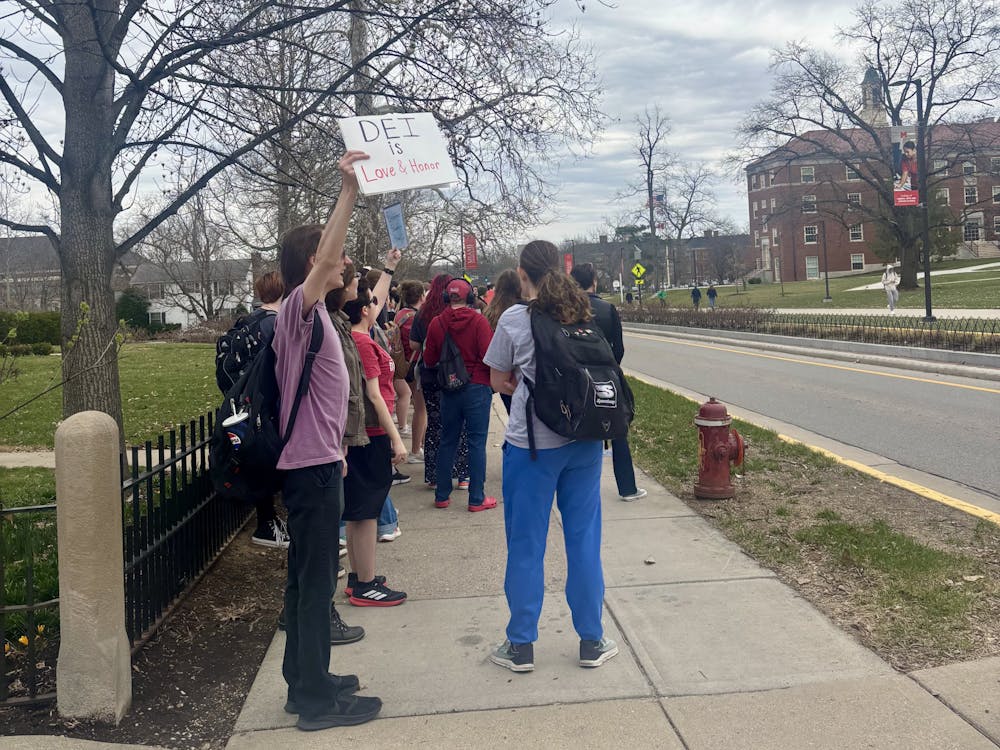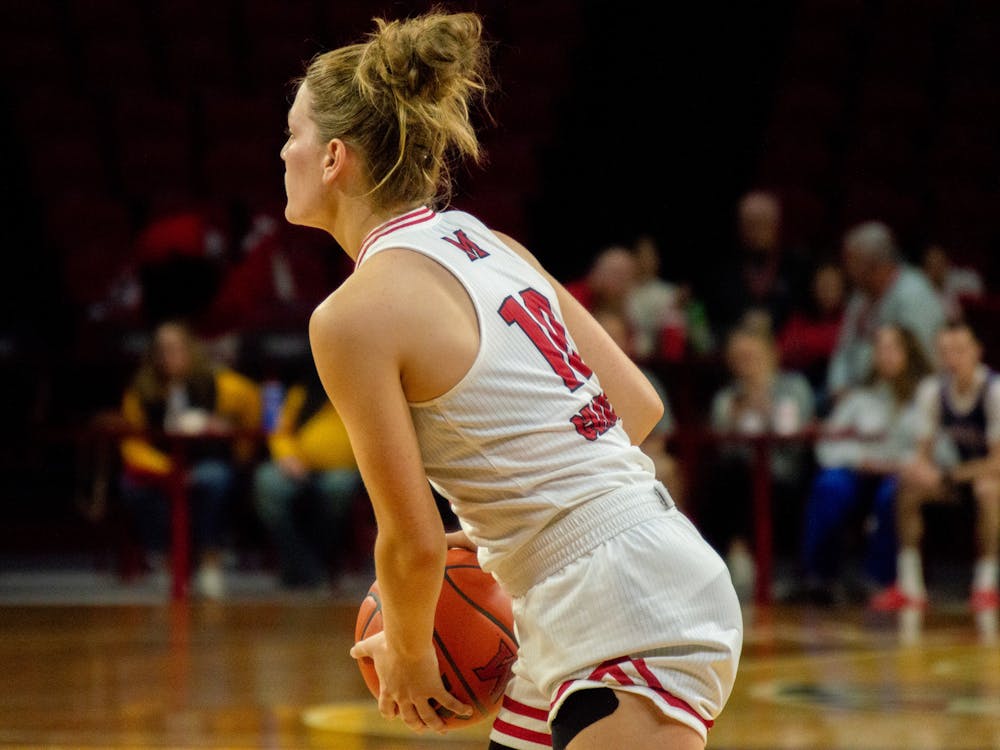Many professors need to travel abroad for research. There are environments that can only be found in certain countries, libraries that can only be accessed in certain cities and people that only reside in one specific place. There are scholarships and grants that help researchers get to these places, but not everyone can access them.
So, in 1987 when Sheldon Anderson wasn’t able to get a Fulbright scholarship to access archives in Poland during the Cold War era, he had to find another way to get there.
He found basketball.
Anderson is a history professor at Miami University, but while he was pursuing his Ph.D. he used his background as a college basketball player to play in a league in Poland from 1987 to 1988 while also doing research there.
“During the night, I practiced and played [basketball],” Anderson said. “I got room and board, and more or less a visa to get in [Poland]. Then I studied my Polish real hard and did my research for a dissertation, which became my first book.”
One of the reasons why Anderson needed basketball to access archives in Poland was because the country was still controlled by the Soviet Union. He later found out this factored into his inability to get a Fulbright scholarship.
“I thought [I was turned down] because my Polish wasn’t that good, but in fact it was because they didn’t think I could get into the archives,” Anderson said. “I met somebody at the embassy in Warsaw when I was in Poland. She said, ‘I remember you ... We turned you down because we didn’t think the communists would let you into the archives to do your work on Cold War Poland.’”
Anderson didn’t just play basketball in Poland, though. He also played in West Germany from 1978 to 1981. During that time, he studied history at three separate universities — first Osnabrück University, then the University of Münster and finally Ludwig-Maximilians University Munich.
Sometimes, Anderson would take goods across the Berlin Wall to his friends in East Germany.
“Under the communist system in East Germany, they were kind of all poor,” Anderson said. “They had fake coffee, fake chocolate and no good wines. So I would bring these kinds of luxury items with me to my friends in East Germany.”
Anderson said while he never intentionally smuggled any illegal goods across the border, he did come under scrutiny for having some newspapers.
“One time I had some papers on the floor in my car, and that was when [the East German police] reacted,” Anderson said. “They started asking me, ‘Why do you have these bourgeois capitalist papers? What are you trying to do? Indoctrinate our East German comrades?’”
Enjoy what you're reading?
Signup for our newsletter
Even though basketball let him travel to and study in Cold War Germany and Poland, Anderson said he never had illusions of becoming a professional player. He tried out for the Carolina Cougars after college and didn’t make it, so he knew his prospects weren’t great.
“I never thought to make my basketball career in Germany my life,” Anderson said. “I mean, come on. In basketball, at 32 you’re already going downhill.”
Anderson’s decision to pursue research and a Ph.D. instead of professional basketball led to him becoming a professor at Miami. Here, he teaches classes on modern world history, diplomacy and sports history.
Anderson said living through history helps him teach students.
“I always see the students brighten up when I tell a story about this or that thing,” Anderson said. “Students’ eyes brighten up when you’ve got some experience being at a university in West Germany or traveling behind the iron curtain in the midst of the Cold War.”
Another signature aspect of Anderson’s teaching is his lecturing ability. Ned Neely, a first-year university studies major, said Anderson has a unique style of talking at the front of the class.
“I honestly think he’s a good professor, but it’s kind of funny how he lectures,” Neely said. “He’ll be super quiet, and then he’ll say something really loud, and all the people who weren’t paying attention kind of lift their heads up.”
Matthew Arnold, a second-year graduate student, liked Anderson’s approach to overseeing graduate students.
“I appreciate his style of management,” Arnold said. “He lets us do what we want when we have to teach and gives us a lot of independence — I vastly prefer that to the more involved nature of some professors I’ve worked with in the past.”
While he eventually became a history professor, Anderson hasn’t given up his passion for basketball quite yet.
“I saw this guy at the Rec playing basketball the other day, and I was like, ‘that’s so familiar,’” Neely said. “I went to [Anderson’s] class the next day, and it was Dr. Anderson!”




